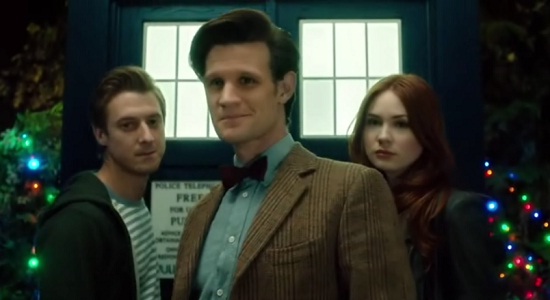 The Power of Three is, for the most part, an absolute cracker of an episode, of the kind that we haven’t had in quite a while. Whilst it may not have ended up being a Blink or a Midnight – an episode that will be talked about for years to come – it certainly marked a great improvement on the hum drum tone so far. It also felt much more like a classic Doctor Who episode than any other this series, and certainly more than many from the quiet relaunch under Moffat.
The Power of Three is, for the most part, an absolute cracker of an episode, of the kind that we haven’t had in quite a while. Whilst it may not have ended up being a Blink or a Midnight – an episode that will be talked about for years to come – it certainly marked a great improvement on the hum drum tone so far. It also felt much more like a classic Doctor Who episode than any other this series, and certainly more than many from the quiet relaunch under Moffat.
When I say Classic-Doctor Who I admittedly refer to it purely as something that, like Professional Wrestling or Star Trek, I find more interesting as a programming concept than an actual show. I’m still to watch much of the pre-relaunch Doctor Who – I’ve seen one full story and snippets of others and if I’m honest it’s not something that I feel any need to go back to.Yet on some purely intellectual level I love the idea behind classic-Doctor Who, and see it as very separate from New Who – my Who. Like wrestling or Star Trek, I can enjoy the knowledge of the universe that I have picked up, recognise the plots and many of the players, all without having actually bothered to sit through a wrestling match or an episode of original Star Trek. I enjoy those things not because of exposure to them, but because of exposure to the idea of them.
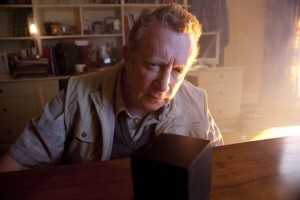 Classic Who, for me, can be boiled down to two things. Firstly, it’s a form of Sci-Fi that emphasises a hope for the future, both for the universe and humanity, rather than a pessimistic vision of progress (in the same vein as Star Trek, or the Legion of Super Heroes).
Classic Who, for me, can be boiled down to two things. Firstly, it’s a form of Sci-Fi that emphasises a hope for the future, both for the universe and humanity, rather than a pessimistic vision of progress (in the same vein as Star Trek, or the Legion of Super Heroes).
Secondly, at its simplest, it’s about solving crimes with your mates – the problems might be bigger than they are in most shows (universal destruction, planetary enslavement, wars between species across all of time and space), and the entire team might change every few seasons, but it’s still the intergalactic equivalent of the Famous Five.
Which is brilliant.
“Classic Who is the intergalactic equivalent of the Famous Five”
On that basis (i.e. the basis of a totally arbitrary and, I’m sure, inaccurate reading of classic Doctor Who) this episode is the most classic of the new-Who episodes we’ve seen in a long time.
Chris Chibnall has now delivered the two best episodes of the season so far (and if you had told me that I would be writing this before Asylum of the Daleks I would never have believed you). The Power of Three is a better episode than either Daleks or Town Called Mercy, but those were supposedly written by two of the best writers in Britain, the auteur show runners of numerous critically lauded and well regarded series, whilst Chris Chibnall … isn’t.
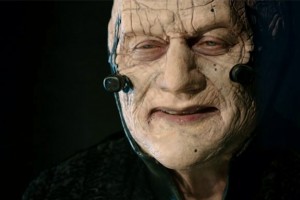 This certainly isn’t a perfect episode – the ending is horribly botched, the episodes pacing feels off and the reveal of the enemy is underwhelming given the build up, but it’s as close as we’ve had for a long while.
This certainly isn’t a perfect episode – the ending is horribly botched, the episodes pacing feels off and the reveal of the enemy is underwhelming given the build up, but it’s as close as we’ve had for a long while.
The idea of the Doctor being forced to slow down whilst a subtler alien invasion than we’re used to takes place is an engaging one and is carried along by the cast with real verve. The excellent work of Karen Gillen and Arthur Darvill over the last few years pays off here as we get to see their weariness towards the constant in-and-out act that The Doctor plays over the years, whilst Mark Williams develops a role that seemingly had very little left to add in Dinosaurs.
The difference between this and Dinosaurs is extreme. If that was the ‘best Chibnall episode’ for Doctor Who, this is just a good episode. The characterisation, plotting, tone, development – every part of this is a real step up from what we’ve seen from him before this.
“Where it works best is in humanising the Doctor”
Where it works best is in humanising the Doctor, giving him a chance to return to his roots as an idealistic figure, someone who inspires, and is inspired by, the best of humanity. By rooting hope as the centre of the Doctor’s take on who we are as a species Chibnall successfully sets the Doctor up as a force for a more enlightened, peaceful, impressive version of humanity than is common in most genre fiction, where an apocalypse is only one failed misadventure away. In fighting against an enemy whose entire masterplan is rooted in removing humanity from history, preventing them from spreading through the universe it moves away from the dominant theme of this season; small scale choices between right and wrong, with a view to removing the Doctor’s unassailable position as a known entity. Instead, we get an episode where the Doctor gets to save everyone. Two billion people may die in the episode, but it’s nothing that a little bit of global electro-paddling can’t fix once it comes time to wrap up the plot.
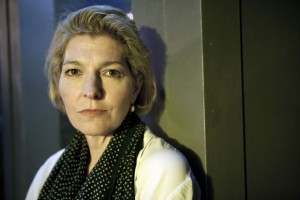 Nowhere is this optimism more clear than in UNIT, now retooled as a more kindly defensive force, less overtly military and more akin to a UN backed Fringe Division, led by the daughter of the Brigadier. In its various forms in New Who UNIT has been, variously, an alternate worldwide version of Torchwood, a fully militarised response force dealing with non-terrestrial threats, and the red shirt army sent in to show how much of a threat a villain of the week is. This is a much more benign, and ultimately more satisfying, incarnation which retains the potential for taking the fight to the enemy whilst taking the science-first approach of Torchwood. For all the talk of the hopefulness of humanity it’s UNIT that shows that more than anything else, even more than the companions.
Nowhere is this optimism more clear than in UNIT, now retooled as a more kindly defensive force, less overtly military and more akin to a UN backed Fringe Division, led by the daughter of the Brigadier. In its various forms in New Who UNIT has been, variously, an alternate worldwide version of Torchwood, a fully militarised response force dealing with non-terrestrial threats, and the red shirt army sent in to show how much of a threat a villain of the week is. This is a much more benign, and ultimately more satisfying, incarnation which retains the potential for taking the fight to the enemy whilst taking the science-first approach of Torchwood. For all the talk of the hopefulness of humanity it’s UNIT that shows that more than anything else, even more than the companions.
In case it isn’t clear, I REALLY liked this episode. The idea of creeping invasions is one dear to my heart (when Cape and Cowl Issue Two comes out you’ll see just how much). From ‘Animorphs’ to ‘The Thing’, ‘Invasion of the Body Snatchers’ to ‘Secret Invasion’, the idea of an alien threat moving amongst us tends to be couched in terms of them hiding unseen. The twist of having aliens invade obviously but appear harmless is one which is less often seen. New Who does have another example of it in Army of Ghosts though, where the Cyber Invasion of Earth is passed off as the (apparently less threatening) return of loved ones from beyond the grave. The whole concept here reminds me more of Trillions, a book by Nicholas Fisk which had a massive impact on me for the central conceit of an invasion of grains of intelligent alien sand which mimics what surrounds it to communicate with humanity. The idea of an invasion that features such innocuous and utterly alien forms as small, black cubes to invade Earth is far more interesting than them actually being time bombs.
“The Doctor has a new challenge to face – boredom.”
It gives the Doctor a new challenge to face – boredom. The hyperactive, pangalactic supersleuth is thrown off by a lack of activity. He is lulled into a false sense of security as well. So for the majority of the episode we’re able to concentrate on character over crisis. The Doctor’s declaration of why he keeps returning to the ponds (he essentially imprinted on them like a child), Amy and Rory realising that they want a home life (and then changing their mind) and the Doctor making a promise he can’t possibly keep to Brian (it’s less whether one of the Ponds dies, and more just how much Moffat will milk it for tears). Every scene is played beautifully, and the story gives each conversation room to breathe before the next one starts. By the time a year has passed and things go wrong it’s easy to have forgotten or dismissed the cubes, leaving the audience in exactly the same position as the characters onscreen.
And through it all, the Doctor gets to spend time with his friends. Because the cubes spend so much time as a secondary issue it gives the Doctor, Amy and Rory something different to do than just run around and avoid death at every turn. Instead, they get to actually enjoy life so that by the end of the episode remember what it is that made them love the Doctor in the first place. Just in time for the inevitable heartbreak of next week, Amy and Rory can accept that their place is with the Doctor, just as he accepts that they are who he comes back to when he wants to see familiar, friendly faces.
“Hope for the future and friendship are keys to Doctor Who”
Hope for the future and friendship. The twin keys to what Doctor Who should be about.
So, whilst the majority of the run time is near perfect it does all breaks down at the ending, and then it breaks down big. Everything that until this point has gone right suddenly falls apart. In all the episodes so far we’ve seen that 42 minutes just isn’t enough to pack in the big summer blockbusters that we were promised. Every story has suffered from an inability to tie up the plot satisfactorily, either choosing to end with the Doctor Who standby of hitting a (reset) button, or a support character resolving the plot when time expires. My major problem with Daleks was that it removed the Doctor from the driving seat, resorting to teleporting him away whilst Oswin achieved the stated aim of the episode. That was repeated last week in Mercy, when Jex blew himself up – an action whose only reason to not have happened 45 minutes and weeks previously was to show how The Doctor can inspire others to act less selfishly.
In fairness to Chibnall then, it is indisputable that The Doctor solves this episodes dilemma and saves the day, by a combination of guile, bravery, team work, and the convenient apathy of an alien who is so unconcerned about the possibility of anyone stopping him that he leaves his ship unguarded to be blown up by anyone who wanders in with a sonic screwdriver.
“All the worst tropes of New Who endings are on display”
All the worst tropes of New Who endings are on display here. We have the rushed explanation (if I wave my sonic screwdriver at the screen it’ll reverse the effects), the appeal to human emotions (you’re a people of hope, so this has to work), the conveniently located reversal button (here’s the console that controls all those cubes, and it’s only protected by a hologram) and, of course, the Sonic Screwdriver is a magic wand cop out (point, click, run away from explosions).
As overused as that trope is it’s usually justified by falling back on the cliché and widely disseminated is the saying that all sufficiently advanced technology has the appearance of magic. But there is a big difference between saying ‘We solved this by science and so it just appears mystical’ and what normally happens on Doctor Who which boils down to ‘Screw it, the Sonic Screwdriver can solve this again’. It’s so frustrating, in an episode which has been unexpectedly interesting, showcased a few beautiful moments between the main characters and developed its idea to the point where everything is coming to a head, that the final scenes are such a let down.
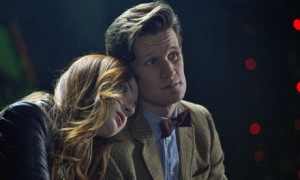 There’s nothing wrong with the idea, but the concept doesn’t stand up to the climax. An alien who wants to remove the humans he sees as vermin is a great concept, and tying it into the Time Lords own history is a great way of reminding us that post-Gallifrey that the Doctor doesn’t always avert the apocalypse. But there’s no clever resolution, or twist on the idea. Everything is solved with the minimum effort. There’s never any real threat, either to humanity or to the characters. The stakes are TOO high – nobody can really see a third of humanity being killed off for real offscreen, so obviously they’ll backtrack. The bad guy isn’t even present, so there’s no chance that they won’t stop his masterplan. Just like that, it’s all over. Everybody lives, and the intricate plans of a cosmic exterminator (who could return at any moment) are ruined because he didn’t password protect his computer.
There’s nothing wrong with the idea, but the concept doesn’t stand up to the climax. An alien who wants to remove the humans he sees as vermin is a great concept, and tying it into the Time Lords own history is a great way of reminding us that post-Gallifrey that the Doctor doesn’t always avert the apocalypse. But there’s no clever resolution, or twist on the idea. Everything is solved with the minimum effort. There’s never any real threat, either to humanity or to the characters. The stakes are TOO high – nobody can really see a third of humanity being killed off for real offscreen, so obviously they’ll backtrack. The bad guy isn’t even present, so there’s no chance that they won’t stop his masterplan. Just like that, it’s all over. Everybody lives, and the intricate plans of a cosmic exterminator (who could return at any moment) are ruined because he didn’t password protect his computer.
In Dinosaurs I mentioned how Chibnall seems to be aping many of the tropes that Moffat has used in the past, and it happens again in this episode. We can tick off everyday objects being transformed into something dangerous, objects protruding from faces. As mentioned, everyone lives thanks to the Doctor’s judicious application of electricity.
“Chibnall’s not there yet but could one day be showrunner material”
The creepy child who isn’t what she seems would also count, but I’m deducting a point for her not actually doing anything once identified. Just as Moffat began series 5 by trying to emulate or better the style of RTD this appears to be Chibnall’s pitch for showrunner status post-Moffat.
He’s not there just yet, that final five minutes just proves it, but I’m more convinced that he could be some day then I was before. Ultimately, that’s the highest praise this episode can get.

The breezy optimism of the episode is one of the things I least liked about the episode. Classic Who has a strong dystopian thread to it. The Daleks and Cybermen are both versions of what humanity could become, if put in the wrong circumstances.
It recalled the cheesier moments of ‘Cold Blood/The Hungry Earth’ where the Doctor is spouting platitudes about humans being basically good and nice (despite all evidence to the contrary).
Russell T Davies did a much better job of keeping humanity’s potential for both good and evil in tension – you’ve got all the “oooh, you humans are wonderful you are,” stuff, but also really dark ideas like the Toclafane – “the human race, the greatest monsters of them all”. I don’t mind optimism in a story, but you’ve got to earn it by also facing up to the worst that humanity has to offer.
The idea that history might be better if humanity is prevented from spreading into the universe is a really interesting one, and was far too casually dismissed by the Doctor. The Doctor ought to know as well as anyone that the human race is capable of terrible things, but that just got conveniently swept aside. Chibnall seems to me to have a shallow understanding of human nature, which makes for poorer drama. Humanity is at its most fascinating when poised between damnation and apotheosis.
Not going to argue with your knowledge of Classic Who Caleb!
I would love to have seen a it more about why the Shakri felt humanity needed to be stopped – was it just that we’re vermin, or was it to prevent something worse happening? Is this just the first attempt at wiping us out (I can see the Shakri reappearing, or at least having a role similar to The Trickster in Sarah Jane Adventures – the man behind the curtain coming up with plots to wipe out humanity).
Having listened to the commentary and now read the review I’m still a bit meah! on this one. A good idea sadly under cooked. It had all the makings of a cracker, good build up, the Brig’s daughter, and the cubes. Where did it all go wrong? The ending of course. Rather much like the RTD “Water of Mars” I found myself thinking what else they could have done. Instead of stopping people’s hearts, the cubes could have imprisoned people or transported them to somewhere else. The cube kidnapping people would have been more thrilling than a bunch of them lying down for a couple of minutes. A Doctor offering himself up to a cube would have made a rescue more plausible.
It was as if Chris Chibnall had got them to the spaceship and suddenly remembered he had to wind things up. I think if the story had been over two episodes things come have been improved and allowed time to breathe properly.
I would personally put Chris Chibnall’s name on the standby list for show runner, right behind the creators of “The Misfits” and “The Fades”.
Looking forward to “Angels of New York”. =)
The ending was definitely a problem … I didn’t feel it ruined the rest of the episode, it just meant it didn’t end on a total high!
I think there are a lot better people to write Doctor Who than Chibnall – Toby Whitehouse, Mark Gatiss, Howard Overman (that’s a great pick by the way Kevin, Misfits was quality)! I think that he’s going to be the obvious pick though. so I’m glad to see that he’s improving!
If we could get “The Fades” Jack Thorne to do the overall plotting, he would give us that sense of menace and build up “Doctor Who” has been lacking. Howard Overman has a great ear for dialogue and is very good at the “monster of the week” format. The Moff can pitch in with the season openers with at least one script from Neil Gaiman or his good friend Terry Pratchett. Now that would be a dream team. =)
Hmm. It appears we enjoy two opposite ends of the spectrum of Who. I have always felt that that whole “Oh no, everyone on the earth is in trouble, save us doctor” attitude was annoying. It frequently leads to deus ex machina endings. For example, the episode at the end of series 4 new Who where we get Tennant 2.0 grown from a hand so that he can swoop in and save the day. This is all after he regenerates without actually regenerating. And at the end of series 3, the world saved Tennant by thinking nice thoughts at him. What is this, the secret? Even Moffat’s Who uses a nano-ship that looks like him in order to get out of his own death, though that one was a bit more clever than the others.
I guess my point is that I agree with Craig Ferguson when he says Doctor Who “is all about the triumph of intellect and romance over brute force and cynicism.” I enjoy episodes like the eleventh hour where he has nothing but his smarts and his friends to beat the bad guys. So I guess we do both enjoy that aspect of it similarly, but I don’t like it when the writers try to turn the Doctor into superman. I enjoy the little bad and good choices that the Moffat run has had because it asks the Doctor to really examine his morality, and whether or not his is a bad guy or a good guy. This is also one of the (few) things I liked about RTD’s run with Tennant- Tennant made himself the ultimate authority sometimes, and it could come back to bite him.
I think the definition of the character is where we really get to see intellect and romance triumph over brute force and cynicism- in the choices the Doctor makes, in whether or not he will be the romantic or the cynicist, the thinker or the killer. When it’s a world-ending plot like this one, it seems too shallow to me. If I want to see good guys punch bad guys, I can watch transformers. I watch Who because of the characters. But I could be reading way too much into this review. Am I reading way to much into your review?
Also, I did enjoy the humanizing, camaraderie, and slow pace like you did. I agree with you on most of this review. I was just wondering what your expectations were.
Thanks Josiah – glad to hear you mostly agree with me.
To clarify, I actually also agree that the whole ‘Doctor save us’ doesn’t work. The main reason it usually happens seems to be because the Doctor, far from being called upon, inserts himself into a crisis.
I’ve written in the past about how the Doctor works like Batman, but to take your Superman reference – I see that as a big part of the appeal! He’s (usually) the optimistic force for good, who fights to protect the weaker. The last of his kind, survivor of a doomed planet, he has a team of companions who aid him in his fight against evil. Of course there are bits which don’t work – Superman’s humanity, his adopted status, his unimpeachable moral code – but generally I think Superman and the Doctor work very well together.
The main thing about both of them are that they are a symbol of hope. However you feel about Batman, nobody seriously looks at him and wishes that life was more like Gotham. Yet Superman is constantly off to the future to visit the Legion of Superheroes, or hanging out with his friends, or just taking a walk across America to reconnect with the little guy. He never stops, he never gives in, and whilst he solves most of his problems by punching and/or lifting things (not a very Doctor-y thing to do at all) he never loses his faith that a) people are, at heart, generally good and b) if you can help, you should.
Maybe that’s what I look for in my Doctor – that Superman-esque wish to do more for the world(s). Or maybe I just want a Superman show that isn’t about his teenage years or love life. One of the two.